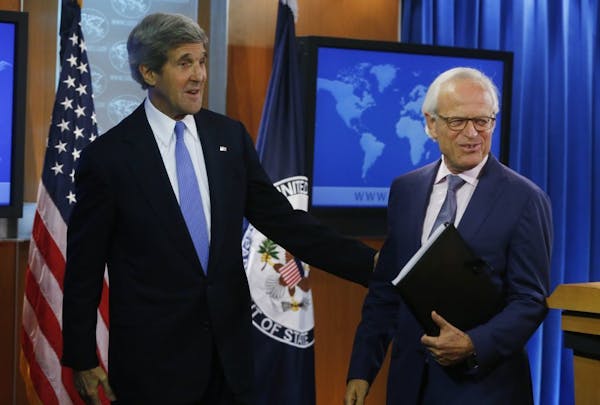UNITED NATIONS — Israel's chief negotiator Tzipi Livni said talks with the Palestinians should start Monday evening when both sides meet in Washington after five years of diplomatic stalemate.
The expectation had been that the Washington meeting would prepare for a new round of Mideast peace talks, but Livni said "the idea is to start the negotiations today."
"There is a lot of cynicism and skepticism and pessimism, but there is also hope," Livni told The Associated Press after meeting with U.N. Secretary-General Ban Ki-moon.
Livni then took the train to Washington for a dinner with the Palestinians hosted by U.S. Secretary of State John Kerry.
Kerry brokered an agreement early this month to bring both sides back to the negotiating table. It included a decision by Israel, which its Cabinet made on Sunday, to free 104 long-held Palestinian prisoners in four stages. That led to Monday night's dinner invitation from Kerry.
"It is the first time we are going to meet with the Palestinians today," Livni said. "But during the last four months, secretary Kerry was in the region working with us and with the Palestinians. So basically we are starting today."
The U.S. has said the meetings on Monday and Tuesday are meant to establish a work plan for the negotiations.
The Palestinians want a state in territories Israel captured in 1967 — the West Bank, Gaza and east Jerusalem, which they want as their capital. They have accepted the principle of limited land swaps to allow Israel to annex some of the dozens of settlements it has built on war-won land.
Palestinian President Mahmoud Abbas had repeatedly said he will only resume talks if Israel either freezes settlements or recognizes the borders before the start of the 1967 war as a starting point for drawing the borders of a new Palestinian state.
The Palestinians initially said remaining gaps on the terms of negotiations would have to be settled in these preliminary talks. However, a senior aide to Abbas has since acknowledged that the Palestinians are heading into talks without Israel having accepted either of their two conditions.
Pressed on whether Israel signs on to that starting point, Livni replied: "You know what, I'm trying to build trust between us and the Palestinians, and the last thing that I want to refer to is what they said before, what they are going to say now. I'm going to meet them and we are going to discuss everything in the negotiations."
She said a lot of core issues are on the table and need to be addressed, including a decision on borders, ending the conflict and security for Israel.
Livni spoke soon after Kerry appointed former U.S. ambassador to Israel, Martin Indyk, to shepherd the peace talks.
"I'm glad that he was nominated," Livni said. "He's familiar with all the situation in the region, the problems. He's very involved, and I'd love to work with him."
She said she shared with Ban "not only our hopes but also the way forward — and I believe that we can have the support of the entire international community and the United Nations in relaunching the negotiations."
Ban expressed "his strong support for the resumption of credible negotiations to achieve the two-State solution," U.N. deputy spokesman Eduardo del Buey said.
